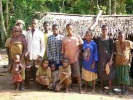 The Oshwe community, in the Democratic Republic of Congo (DRC), launched of the first-ever solar-powered radio station in their province. The radio is based in an area outside to the electric grid, as most of the rural area in DRC, but its function is critical to keep informed the communities in remote forest areas, and to reveal cases of abuses and illegal deforestation.
The Oshwe community, in the Democratic Republic of Congo (DRC), launched of the first-ever solar-powered radio station in their province. The radio is based in an area outside to the electric grid, as most of the rural area in DRC, but its function is critical to keep informed the communities in remote forest areas, and to reveal cases of abuses and illegal deforestation.
The Oshwe region is in the middle of the forest of the Bandundu province. It borders the southern part of the Salonga National Park, an important biodiversity hotspot. The population essentially lives off hunting, agriculture, and fishing. Oshwe region covers about 43.000 km2', and like many other parts of the Congo Forest Basin is under threat from unscrupulous international logging companies abetted by governments.
The new installation highlights the strong partnership between Greenpeace and Oshwe's population; the result of two years of intensive work in the area.
Over the past few years Greenpeace has reached out to forest communities to explain just how and why they should protect the forest; and understand their rights around the protection of their forests, while suggesting viable and sustainable alternatives to deforestation.
According to Loan Tran Thanh, DRC Country Manager for Greenpeace Africa: "The radio station will now no longer depend on an expensive, noisy, and polluting fuel generator - a perfect example of the renewable energy opportunities that are a solution for communities like this."
Along with solar panel installations, the antenna of the radio station has also been raised in order to reach distant villages in a 100km radius. This will give many more forest communities access to the vital news that the radio broadcasts.
"We believe that the Oshwe communities who live in the world's second largest rainforest will finally know what is happening in DRC, and understand the implications of decisions being made in the capital city, Kinshasa, particularly around their resources ," added Tran Thanh.
As part of the project, Greenpeace trained 12 young volunteers to ensure the maintenance of the solar installations in the community.
"Not only do we know how to install and maintain solar panels, but also have picked up skills that will benefit us and our families," said Poly Boyolo, one of the participants in this training.
"We hope that the DRC's government will see how important the solar-powered radio is in connecting with the forest communities while being an example of possible successful sustainable development projects in previously remote places, without necessarily destroying the World's second lung after the Amazon forest . " concluded Tran Thanh.


